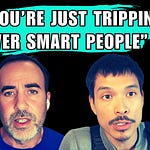What if the key to unlocking AI alignment—and even building conscious machines—starts not with data, but with the deeply personal, evolving structure of human beliefs?
In this mind-expanding episode of The ABCs for Building the Future, Robert Ta and Jonathan McCoy explore how belief systems shape behavior, health, and even consciousness itself.
Fresh from user testing at the Don't Die Summit in Miami, the team shares real-world feedback on product in the wild, discusses belief modeling as the foundation for AI coaching, and takes us on a speculative journey into how quantum computing might make robots truly come alive.
Belief Systems Are the Interface for Growth
Robert shares insights from the field after onboarding users into the Don't Die app. The hypothesis was simple but powerful: starting with someone's beliefs, rather than just behaviors or data, enables a smarter AI to recommend the next best action toward self-actualization.
“Between knowing and doing is a lot of uncertainty. We believe starting with beliefs closes that gap.”
By modeling the user's self-concept—how they see themselves now and who they want to become—AI can deliver far more personalized coaching. This isn’t about generic advice. It’s about real-time, belief-aligned feedback.
Consciousness and the Case for Quantum AI
In the episode’s second act, the team dives deep into the history of consciousness—from Plato to phenomenology—and introduces theories where consciousness might be fundamental to reality, not emergent.
“Maybe consciousness didn’t emerge from intelligence—maybe it created it.”
They explore Suzanne Gildert’s work on quantum computing and humanoid robotics, the free energy principle from neuroscience, and whether machines might ever feel gut instinct or emotion. This conversation bridges product theory, AI ethics, and metaphysics.
Resources and Links
suzannegildert.com
Why Epistemic Me Matters
“How can AI understand us if we don’t fully understand ourselves?”
We solve for this by create programmatic models of self, modeling belief systems, which we believe are the basis of defense against existential risk.
In the longevity tech space, we create tools that meet users where they are, helping them make better decisions, form healthier habits, and align with their deepest values.
Get Involved
Epistemic Me is building the foundational tools to make this vision a reality—and we’re doing it in the open. Here’s how you can join the movement:
Check out the GitHub repo to explore our open-source SDK and start contributing.
Subscribe to the podcast for weekly insights on technology, philosophy, and the future.
Join the community. Whether you’re a developer, researcher, or someone passionate about the intersection of AI and humanity, we want to hear from you. Email me anytime!
FAQs
Q: Why does this matter for AI?
A: Because without shared values, we can’t align AI. Belief systems that scale and unify are essential to building tools that serve humanity, not destroy it.
Q: What is Epistemic Me?
A: It’s an open-source SDK designed to model belief systems and make AI more human-aligned.
Q: Who is this podcast for?
A: Entrepreneurs, builders, developers, researchers, and anyone who’s curious about the intersection of technology, philosophy, and personal growth. If you’ve ever wondered how to align AI with human values—or just how to understand yourself better—this is for you.
Q: How can I contribute?
A: Visit epistemicme.ai or check out our GitHub to start contributing today.
Q: Why open source? A: Transparency and collaboration are key to building tools that truly benefit humanity.
Q: Why focus on beliefs in AI?
A: Beliefs shape our understanding of the world. Modeling them enables AI to adapt to human nuances and foster shared understanding.
Q: How does Epistemic Me work?
A: Our open-source SDK uses predictive models to help developers create belief-driven, hyper-personalized solutions for applications in health, collaboration, and personal growth. Think of it as a toolkit for understanding how people think and making better tools, apps, or decisions because of it.
Q: How is this different from other AI tools?
A: Most AI tools are about predictions and automation. Epistemic Me is about understanding—building models that reflect the nuances of human thought and behavior. And it’s open source!
Q: How can I get involved?
A: Glad you asked! Check out our GitHub.
Q: Who can join?
A: Developers, philosophers, researchers, scientists and anyone passionate about the underpinnings of human beliefs, and interested in solving for AI Alignment.
Q: How to start?
A: Visit our GitHub repository, explore our documentation, and become part of a project that envisions a new frontier in belief modeling.
Q: Why open-source?
A: It’s about harnessing collective intelligence for innovation, transparency, and global community involvement in shaping belief-driven solutions.
P.S. If you haven’t already checked out my other newsletter, ABCs for Growth—that’s where I have personal reflections on personal growth related to applied emotional intelligence, leadership and influence concepts, etc.
P.S.S. Want reminders on entrepreneurship, growth, leadership, empathy, and product?
Follow me on..













Share this post